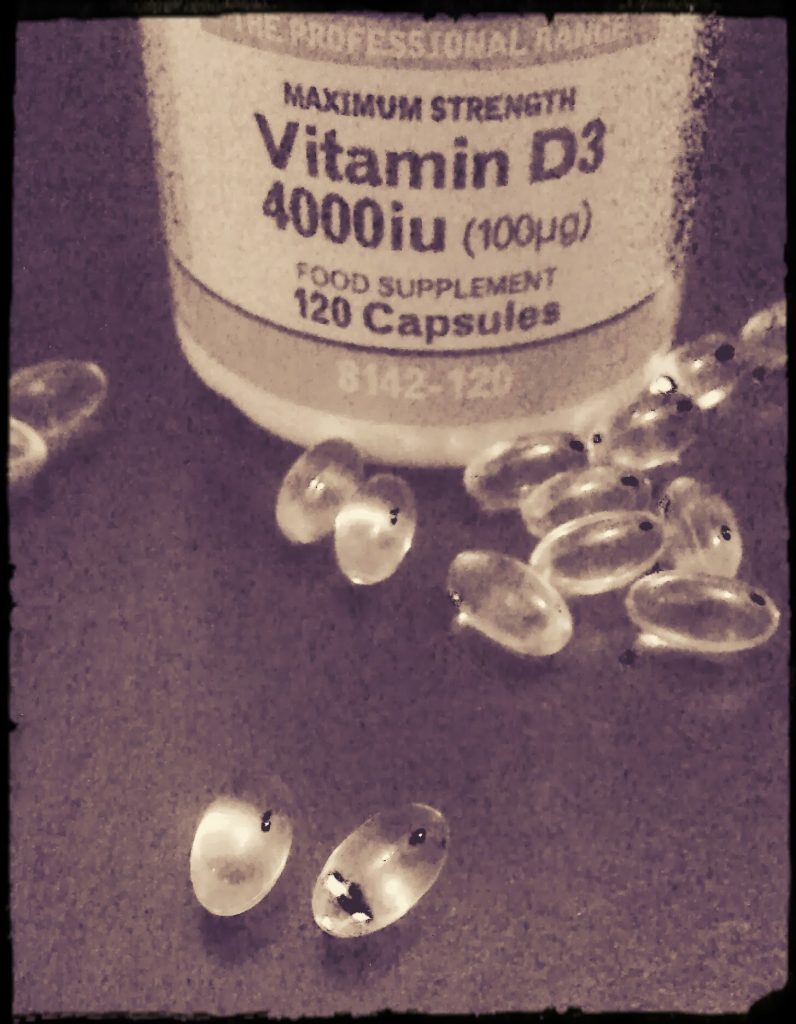 Vitamin D is becoming a popular supplement, and for good reasons. Recent research suggests that the vitamin D levels of those living at higher latitudes is too low due to inadequate sunlight exposure, particularly during the winter months. Low levels of the active metabolite of vitamin D, 25-hydroxyvitamin D, have been shown to increase the risk of a number of diseases including diabetes, metabolic syndrome, cardiovascular disease, multiple sclerosis and cancer. This likely relates to the role of vitamin D in cell regulation and immunity. The recommended daily intake of vitamin D varies between countries but is commonly around 200 IU (5 μg) per day. However, current scientific evidence suggests that 2000 IU or higher is required during periods of limited sunlight exposure in order to maintain adequate vitamin D levels. The 200 IU per day dose appears to be able to protect individuals from the classic vitamin D deficiency diseases of osteomalacia and rickets but may not provide enough vitamin D to produce optimal health.
Vitamin D is becoming a popular supplement, and for good reasons. Recent research suggests that the vitamin D levels of those living at higher latitudes is too low due to inadequate sunlight exposure, particularly during the winter months. Low levels of the active metabolite of vitamin D, 25-hydroxyvitamin D, have been shown to increase the risk of a number of diseases including diabetes, metabolic syndrome, cardiovascular disease, multiple sclerosis and cancer. This likely relates to the role of vitamin D in cell regulation and immunity. The recommended daily intake of vitamin D varies between countries but is commonly around 200 IU (5 μg) per day. However, current scientific evidence suggests that 2000 IU or higher is required during periods of limited sunlight exposure in order to maintain adequate vitamin D levels. The 200 IU per day dose appears to be able to protect individuals from the classic vitamin D deficiency diseases of osteomalacia and rickets but may not provide enough vitamin D to produce optimal health.

Current recommendations for vitamin D may be too low. While the recommended intake varies between countries it is currently set at around 200 IU (5 μg). While 2000 IU of vitamin D per day is often recommended by nutritionists and researchers, even this amount may be too low to provide optimal vitamin D concentrations in the blood of an adult. The recommended amounts of vitamin D have historically been set based on the amount of the vitamin required to treat osteomalacia or rickets in adults and children, respectively. However, other physiological functions for vitamin D are known and may require much higher intakes of the vitamin. These other physiological functions include cell regulation and immune functions. Evidence suggests that a plasma level of 25-hydroxyvitamin D (the active metabolite of vitamin D in the blood) can reach from between 105 to 163 nmol/L from normal sun-rich living conditions. In some cases, the plasma 25-hydroxyvitamin D concentration of individuals from research case studies, who were exposed to sun-rich conditions, were recorded at over 200 nmol/L. To obtain a blood level of 25-hydroxyvitamin D above 100 nmol/L would require a daily intake of at least 4,000 IU in the absence of sunlight. To obtain a plasma value of 25-hydroxyvitamin D of 140 nmol/L may require 10,000 IU per day if sun exposure is absent. Therefore the current 2000 IU recommendation is well within the margin of safety based on the levels obtainable from sun-rich living. It is likely that this value will be revised up as more is understood about the safety and function of the vitamin.
Total exposure of the body to sunlight results in a production of vitamin D of around 10,000 IU (250 μg). This puts into context the 200 IU per day recommended by health authorities in many countries. Studies suggest that blood (plasma) levels of vitamin D up to 140 nmol/L (56.1 ng/mL) are safe and that a value of around 100 nmol/L (40 ng/mL) is optimal. In order to obtain a 25-hydroxyvitamin D above 100 nmol/ L, a daily intake of 4000 IU of vitamin D would be required by a typical adult. Because the response to vitamin D has a flat response curve, it is known that to obtain a plasma level above 140 nmol/L an intake of 10,000 IU (250 μg) would be required daily. However, toxicity studies involving vitamin D show that an intake of more than 40,000 IU (1000 μg) daily, may be required to cause the hypercalcaemia associated with vitamin D toxicity. This has lead researchers to suggest that the 2000 IU (50 μg) no adverse effects for vitamin D is currently set at a safety margin of 5 times lower than it needs to be.
Eat Well Stay Healthy, Protect Yourself
RdB
